Luce Faculty Seminar
2003

Mind-Computer
Interactions
|
Opening
Mario Incayawar, M.D., M.Sc.
Henry R. Luce Professor in Brain, Mind and Medicine:
Cross-Cultural Perspectives
Pitzer, Claremont McKenna, Harvey Mudd Colleges.
Welcome
F. Sheldon Wettack
Vice-President and Dean of Faculty
Harvey Mudd College
|
First
Session
March 7, 2003
Introducer
Cristina Leal, CMC Student
|
|
Second
Session
April 4, 2003
Introducer
Cristina Leal, CMC
Student |
|
Relationship of Computer Hassles and Somatic
Complaints
Richard
A. Hudiburg, Ph.D.

University of
North Alabama
|
|
The Phenomenology of Compulsive Computer Use
 Donald
W. Black, M.D.
Donald
W. Black, M.D.
University
of Iowa |
Virtual Reality Based Psychotherapy
Milton
Huang, MD.

Emotrics, LLC |
|
Cybersuicide: The Internet and Suicide
 Adekola
Alao, M.D.
Adekola
Alao, M.D.
Upstate Medical
University |
Prosthetic Electronic Retina
Harvey
Fishman, M.D., Ph.D. 
Stanford Ophthalmic Tissue Engineering Laboratory |
|
Computer Usage and its Relationship
with Adolescent Lifestyle in Hong Kong
 Samuel
M.Y. Ho, Ph.D.
Samuel
M.Y. Ho, Ph.D.
The
University of Hong Kong |
Moderator
Minds, Machines, and
Bodies: The Social Turn
Prof. Sal Restivo

Professor of Sociology, Science Studies, and
Information Technology Department of Science & Technology Studies
& Information Technology Program Rensselaer Polytechnic Institute
Special Professor, Nottingham University, United Kingdom
Hixon-Riggs Professor, Harvey Mudd College, 2002-2003
|
|
Moderator Frustration Mounts, Happy
Compromise Reached, Blow Out: Computers and their Humans
 Prof. Wenda K. Bauchspies
Prof. Wenda K. Bauchspies
Assistant Professor of Science, Technology, and Society, Pennsylvania State University |
This event is free and
open to the public
Location
First Session: Humanities Auditorium, Scripps
College, Claremont.
Second Session: Mary Pickford
Auditorium, Bauer Center, Claremont McKenna College, Claremont.
Time
10:00 AM to 12:30 PM
Lunch-discussion
First Session: Margaret Fowler
Garden, Scripps College Second
Session: McConnell Living Room, Pitzer College
|
Seminar
Coordinator
Lise Bouchard, Ph.D.
Driving Directions and Maps
Humanities Auditorium, Scripps College, Claremont.
Directions
& Campus Map
Mary Pickford Auditorium, Bauer Center, Claremont
McKenna College, Claremont.
Directions &
Campus
Map

|
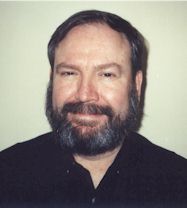
|
Richard A. Hudiburg,
Ph.D.
Relationship of
Computer Hassles to Somatic Complaints
Friday, March 7, 2003
The investigation of Human-Computer
interactions has been a topic of interest to researchers for more than 30
years. Researchers have produced numerous psychological measures
characterizing these interactions. Starting with Lee's 1963 national
survey of computer attitudes, researchers have developed self-report
measures of computer anxiety, computerphobia, computer aversion, computer
efficacy, and computer stress. Research has shown that these various
human-computer interaction outcome measures are empirically related and
empirically different. The Computer Hassles scale has been shown to be a
different construct from the other human-computer interaction measures.
This presentation will show that the Computer Hassles Scale has been shown
to be consistently correlated with reports of somatic complaints and
anxiety. Additionally, there will be a review of current research on how
computer use relates to the psychophysiology of work stress with specific
attention to musculosketal symptoms.
Dr. Richard A. Hudiburg received
undergraduate degrees from Monterey Peninsula College, Monterey,
California and Sonoma State University, Rohnert Park, California. He
received an M.A. and Ph.D. in Experimental Psychology from Texas Christian
University, Fort Worth, Texas. He has received graduate training and
taught computer science at the University of North Texas, Denton, Texas.
He has worked as a psychologist at two institutions for the developmental
disabled (in Texas and New York).
Dr. Hudiburg is currently Professor of
Psychology at the University of North Alabama, Florence, Alabama where he
has been on the faculty since 1983. Dr. Hudiburg has maintained a research
interest in the effects of human-computer interactions. He has developed a
research scale, the Computer Hassles Scale, which has been translated into
five languages. Dr. Hudiburg has served as president of the Alabama
Academy of Science. He is interested in research topics related to using
Web based data collection and cellular telephone use behavior. Dr.
Hudiburg has other computer interests, in particular computer hardware
developments. He serves as the webmaster for four websites.
References:
 | Hudiburg, RA. Computer Hassless
Scale: A Measure of Computer Stress. In Zalaquett, CP & Wood RJ
(Eds.) Evaluating Stress: A Book of Ressources. Lanham, MD:
Scarecrow Press, 1997, pp. 41-50. |

|
|
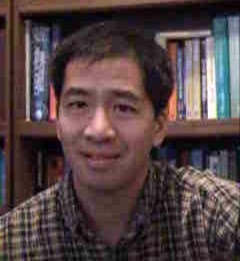
|
Milton Huang, M.D.
Virtual Reality
Based Psychotherapy
Friday, March 7, 2003
Technology advances have lead to the
greater availability of Virtual Reality (VR) devices, and a related
increase in the application of these technologies to mental health
treatment. Researchers and therapists have used these technologies
in the treatment of phobias and other fear disorders, body image
disturbance and eating disorders,
autism, and pain control. Research on the effectiveness of these
techniques is still in its infancy, but current experience suggests that
VR may allow us to affect mental processes in ways we have never been able
to before. This talk will review some of the research and
therapeutic applications of VR, as well as explore the question of
how
VR obtains its effects.
Dr. Milton P. Huang received two
undergraduate degrees from Stanford University, a B.S. In Electrical
Engineering and a B.A. in Psychology. He obtained his medical training at
the University of Texas Health Science Center in San Antonio, Texas.
Dr. Huang is a certified surgeon and
physician. He has been a research fellow, lecturer and
professor at the University of Michigan at Ann Arbor. He is currently the
President, CEO and Chief Scientist at Emotrics, LLC.
References:
 | Glantz, K; Durlach, NI; Barnet, RC;
Aviles, WA. (1997) Virtual reality (VR) and psychotherapy:
Opportunities and challenges. Presence-Teleoperators and Virtual
Environments, 6(1), 87-105.
|

|
|
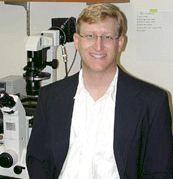
|
Harvey Fishman,
M.D., Ph.D.
Prosthetic
Electronic Retina
Friday, March 7, 2003
Age-related macular degeneration (AMD) is
the most common form of severe and irreversible blindness in the U.S. Dr.
Fishman research program consists of a highly interdisciplinary effort between
physicians, engineers, and scientists to develop a neural interface that
will connect the output from a digital camera to individual retinal cells
in patients with AMD, thus bypassing injured cells. Present prosthetic
devices stimulate neurons electrically with limited spatial control and
without cell type specificity. His purpose is to explore whether neuronal
growth from a specific retinal cell layer can be directed onto a chip
where focal neurotransmitter or electrical stimulation would provide a
more physiologic and neuron-specific transfer of information. To
accomplish this, he is adapting BioMEMs technology to construct an
artificial nerve connection that will be fashioned from flexible
biomaterials and upon which the microcircuitry of retinal cells will be
re-grown.
The ability to direct the growth of
retinal-cell neurites and to stimulate them with a microfluidic
neurotransmitter delivery system demonstrates the feasibility of a visual
prosthesis interface based on direct neuronal stimulation with
physiologically appropriate neurotransmitters. This neural interface
represents a new paradigm in the field of electronic prosthetic retinas
that are being developed worldwide. In addition to advancing the treatment
of AMD, this method will have wide-reaching applications in spinal cord
injuries and in the field of tissue engineering. These bioengineering
technologies will help bring basic science discoveries into clinical
realities and bridge the gap from bench to bedside.
Harvey A. Fishman, M.D., Ph.D., is Director of
Ophthalmic Tissue Engineering, Department of Ophthalmology, Stanford
University School of Medicine. Dr. Fishman received his Baccalaureate
degree in Chemistry. He then earned a Ph.D. in Chemistry with an emphasis
in Neuroscience from Stanford University. He then earned an M.D. degree from Stanford University. He completed a medical internship at St.
Mary's Hospital in San Francisco and is currently a licensed Physician in
the State of California. Dr. Fishman's area of expertise is translational research
that uses a multidisciplinary approach to develop novel therapies for
blinding diseases in the eye - in particular, Age-Related Macular
Degeneration. His research bridges the gaps between tissue engineering,
surface science, nanofabrication, chemistry, neuroscience and retinal
transplantation biology in Ophthalmology. His background in new
technologies and medical science is diverse including bioMEMS, chip-based
microfluidics and confocal and time-lapse microscopy, neuroscience/nerve
cell regeneration and macular diseases in ophthalmology. He has made
contributions in the fields of microfluidics, laser-induced fluorescence
detection, separation science, and biosensors.
References:
 | Lee, C.J.; Huie, P.; Leng, T.;
Peterman, M.C.; Marmor, M.F.; Blumenkranz, M.S.; Bent, S.F., Fishman,
H.A. (2002) Arch Ophthalmol, 120(12), 1718-1718. |

|
|

|
Sal Restivo,
Ph.D.
Minds, Machines,
and Bodies: The Social Turn
Friday, March 7, 2003
Sal Restivo is Professor of Science
Studies, Sociology, and Information Technology at Rensselaer Polytechnic
Institute, Hixon/Riggs Professor of Science, Technology, and Society at
Harvey Mudd College, and Special Professor of Mathematics Education at
Nottingham University in England. One of his current projects is a book
with Dr. Leslie Brothers in which the mind/body problem is tackled at the
intersection of sociology and neuroscience, The Mind Manifesto. He is also
editing the Oxford Encyclopedia of Science, Technology, and Society.
In his presentation, he will give a brief
introduction to the historical context for and recent developments in
social cognition, social cognitive neuroscience, and the sociology of
mind. More generally, he will draw attention to the social turn in the
various sciences of mind, brain, and body.
Dr. Restivo is the author of The Social
Relations of Physics, Mysticism, and Mathematics (1983), The Sociological
Worldview (1991), Mathematics in Society and History (1992), and Science,
Society, and Values: Toward a Sociology of Objectivity (1994). He is also
co-editor (with C.K. Vanderpool) of Comparative Studies in Science and
Society (1974); co-editor (with J.P. Van Bendegem and Roland Fischer) of
Math Worlds: Philosophical and Social Studies of Mathematics and
Mathematics Education (1993); and co-editor with Jennifer Croissant of
Degrees of Compromise: Academic Values and Industrial Interests (2000).
Some of his work has been translated into Chinese, Swedish, Roumanian, and
Russian. He has lived, studied, and taught in Michigan, Ontario (Canada),
Connecticut, Massachusetts, Vermont, New York, London (UK), Brussels
(Belgium), Birmingham (UK), Copenhagen (Denmark), and Goteborg
(Sweden).
References:
 | Romancing the Robots: Social Robots
and Society. For a PDF copy, click here  |

|
|

|
Donald W. Black,
M.D.
The Phenomenology
of Compulsive
Computer Use
Friday, April 4, 2003
Compulsive computer use has attracted
increasing attention from professionals and lay persons. The
prevalence is unknown, although widespread computer availability and the
increasing popularity of the Internet suggest that compulsive computer use
is a growing problem. While there are no accepted definitions, it
has been described as a preoccupation with computer usage that is overly
time consuming, causes personal distress (mostly through one's sense of
loss of control), and has the potential to cause interpersonal,
occupational, financial, or legal consequences. The author describes
the results of several case series on persons with compulsive computer use
including his own study of 21 persons (16 men, five women) who were
evaluated with structured and semi-structured assessments including the
Diagnostic Interview Schedule (DIS), the Personality Diagnostic
Questionnaire (PDQ), and the Minnesota Impulsive Disorders Interview
(MIDI). In this series, subjects had a mean age of 32 years with a
range of 19 to 62 years. The transition from initial to problematic
computer use took a mean of 11 years. Subjects spent a mean of 27
hours in "non-essential" computer use. According to DIS
results, about one-third had a lifetime mood disorder, 38% had a substance
use disorder, and 19% had an anxiety disorder. Fifty-two percent met
criteria for a personality disorder. On the Short Form-36 Health
Survey, subjects showed impaired mental health functioning. The
author also discusses the connection between compulsive computer use and
Internet pornography, shopping, and gambling. The author concludes
that compulsive computer use is definable, has characteristic features,
and has all of the earmarks of a valid psychiatric disorder.
Donald W. Black, MD is currently a
professor of Psychiatry at the University of Iowa Roy J. and Lucille A.
Carver College of Medicine. He is a graduate of Stanford University
and the University of Utah College of Medicine. He completed his
training in psychiatry and a fellowship in Psychiatric Epidemiology at the
University of Iowa. Dr. Black divides his time between patient care,
teaching, and research. He also serves as a consultant to the Iowa
Department of Corrections. He has received the University of Iowa
Collegiate Teaching Award for excellence in teaching and has been listed
in "Best Doctors in America". His research has focused on
compulsive behaviors and severe personality disorders, and he has recently
received NIMH funding to support treatment studies of pathological
gambling and borderline personality. His book Bad Boys, Bad Men -
Confronting Antisocial Personality Disorder was published by Oxford
University Press in 1999. Dr. Black's work has attracted
international attention, and has been profiled on television programs
including "20/20", "Dateline", and "48
Hours".
References:
 | Black DW, Belsare G, Schlosser
S. Clinical features, psychiatric comorbidity, and health
related quality of life in persons reporting compulsive computer use
behavior. J Clin Psychiatry 1999; 60:839-844. |

|
|
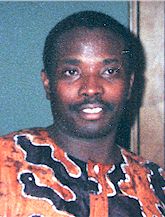
|
Adekola Alao, M.D.,
MRCPsych
Cybersuicide: The
Internet and Suicide
Friday, April 4, 2003
The internet as a widespread source of
communication is already having a significant influence in medicine and
psychiatry. Although the internet has great potential in psychiatric
education, clinical care and research, its impact on social issues should
not be underestimated. First, the internet as a means of communication may
encourage suicidal behavior by depicting networks in which suicide may be
common. Second, some internet websites may discourage people with mental
illness from seeking psychiatric help, condone suicide and forbid entry to
anyone offering to discourage users from committing suicide. On the
contrary, the internet could be a resource to help a potentially suicidal
person get help. The internet could be used to identify and communicate
with those at risk of suicide by encouraging self-disclosure. The internet
is a powerful communication tool that can be used to benefit suicide
patients if used appropriately.
Dr. Alao obtained his MD degree at the
College of Medicine, University of Ibadan, Nigeria in 1983 and obtained
his Master's in Mental Health Studies from Guy Hospital, London, in 1995.
He completed his first psychiatry residency training at the University of
Oxford, England, in 1996 and became a member of the Royal College of
Psychiatrists, United Kingdom (MRCPsych). After he completed his second
psychiatric residency training at SUNY Upstate Medical University in 1998,
he joined the faculty as Assistant Professor of Psychiatry and Associate
Medical Director of the Inpatient Unit. He is board certified in
psychiatry and administrative psychiatry. Dr. Alao's interests are in
psychogeriatrics, the interface of psychiatry and medicine, chronic pain,
sickle cell disease and the relationship between psychiatry and the media.
He has published over 50 articles.
References:
 | Thompson, S. (2001). Suicide and the
Internet. Psychiatric Bulletin England: Royal Coll of Psychiatrists,
25(10), 400.
|

|
|
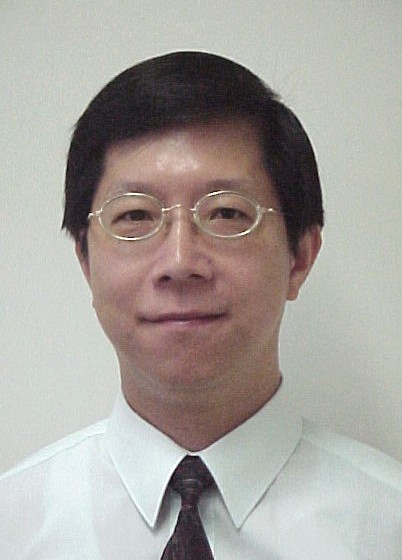
|
Samuel M.Y. Ho,
Ph.D.
Computer Usage and
its Relationship with Adolescent Lifestyle in Hong Kong
Friday, April 4, 2003
Samuel M.Y. Ho is an Associate Professor of
the Department of Psychology and the Associate Director of the Centre on
Behavior Health of the University of Hong Kong. He also has founded the
University of Hong Kong -Tsinghua University Joint Research Center for
Psychological Counseling with the support of a research grant from the
University of Hong Kong. Dr. Ho’s research interests lie in the
area of health and clinical psychology, especially in lifestyle appraisals
and positive gains after traumatic experience. He is also interested in
treatment effectiveness and indigenous psychotherapy. Besides journal
articles, Ho has edited two books and was the invited speakers and keynote
speakers in many conferences on topics related to his areas of research.
Drawing from his published study on the
same topic (Journal of Adolescent Health, 29, 258-266), Dr. Ho will first
describe the patterns
of computer usage among adolescents in Hong Kong. Then he will present
data on the relations between computer usage and lifestyles in his study.
He will show that computer users tend to engage in social-physical
activities more frequently and have higher social support than
non-users. But among computer users, the amount of time spent daily
on the computer is not associated with a sedentary lifestyle.
Instead, patterns of computer usage are more related to lifestyle and the
relationship is moderated by gender. The presentation will argue
that the patterns of computer usage need to be taken into consideration
when studying the relationships between computer usage and
physical-psychological well-being of individuals.
References:
 |
Ho, SMY. Computer Usage and its
Relationship with Adolescent Lifestyle in Hong Kong. Journal of
Adolescent Health 2001;29:258-266. |

|
|
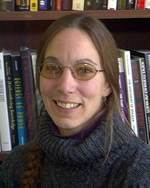
|
Wenda K.
Bauchspies, Ph.D.
Frustration
Mounts, Happy Compromise Reached, Blow Out: Computers and their Humans
Friday, April 4, 2003
Dr. Bauchspies is a faculty member in the
STS Program of Penn State University, and the coordinator of the STS Graduate Studies. Her research
and publications are in the areas of sociology and anthropology of science
and knowledge, women's studies, African studies, and education in
transnational contexts. Her latest project explores the roles of emotions
in scientific inquiry. She is an interdisciplinary/international scholar
who focuses on issues of knowledge, power, difference, and gender. Her
recent publications have appeared in in Cultural Dynamics ;Social
Epistemology ;Science, Technology and Society; Knowledge and Society;
Science as Culture; and Communication and Cognition.
Her presentation will explore notions of
emotions and rationality through a discussion of what computers endure at
the hands of their humans. Specifically, she will look at how notions of
emotion and rationality get played out in computer human interactions. The
goal of her presentation is to articulate some of the hidden assumptions
of computer usage and the pathways that they create for both user and
used.

|
 
|
